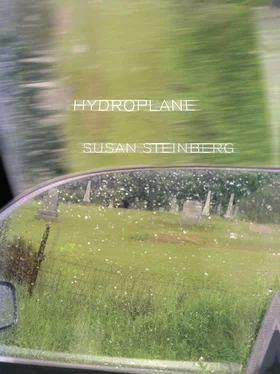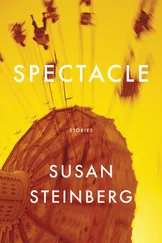Susan Steinberg - Hydroplane - Fictions
Здесь есть возможность читать онлайн «Susan Steinberg - Hydroplane - Fictions» весь текст электронной книги совершенно бесплатно (целиком полную версию без сокращений). В некоторых случаях можно слушать аудио, скачать через торрент в формате fb2 и присутствует краткое содержание. Год выпуска: 2006, Издательство: Fiction Collective 2, Жанр: Современная проза, на английском языке. Описание произведения, (предисловие) а так же отзывы посетителей доступны на портале библиотеки ЛибКат.
- Название:Hydroplane: Fictions
- Автор:
- Издательство:Fiction Collective 2
- Жанр:
- Год:2006
- ISBN:нет данных
- Рейтинг книги:4 / 5. Голосов: 1
-
Избранное:Добавить в избранное
- Отзывы:
-
Ваша оценка:
- 80
- 1
- 2
- 3
- 4
- 5
Hydroplane: Fictions: краткое содержание, описание и аннотация
Предлагаем к чтению аннотацию, описание, краткое содержание или предисловие (зависит от того, что написал сам автор книги «Hydroplane: Fictions»). Если вы не нашли необходимую информацию о книге — напишите в комментариях, мы постараемся отыскать её.
Hydroplane: Fictions — читать онлайн бесплатно полную книгу (весь текст) целиком
Ниже представлен текст книги, разбитый по страницам. Система сохранения места последней прочитанной страницы, позволяет с удобством читать онлайн бесплатно книгу «Hydroplane: Fictions», без необходимости каждый раз заново искать на чём Вы остановились. Поставьте закладку, и сможете в любой момент перейти на страницу, на которой закончили чтение.
Интервал:
Закладка:
My brother read his comic. He wore his headphones.
The date looked at her lap. She was devout. A good one. But her pants were pink and up her crack. In the States she would have been another kind of lady. My brother and I saw this kind of lady when we took the long way home from the park. Some of the ladies were men. They called my brother Sugar. This made my brother laugh.
I should say, before I forget, that I liked the city. San Juan. Music came from every doorway. There were dogs on the sidewalks. Hookers on the sidewalks. Smells like the smell of burning meat.
On the ride home from dinner no one spoke. I sat as far from the date as I could. I pressed my face to the window and thought of my face pressed to the window. I thought of what it looked like from the other side. I thought of some kid in another back seat. How he would look at me with my face pressed tight. He would know I was stupid and from the States. He would know I couldn't climb a palm. I couldn't split a coconut. I liked American coconut shredded in a bag. Hamburgers on rolls. Kentucky Fried. And I thought of the goat who ran into weeds. And I thought of how to find the goat. And if I found the goat of what I would do. I would treat it like it was a dog.
I don't believe there was a man in a ski cap. I think the date punched my father in the face. I think the date's husband punched my father in the face. I think a hooker punched my father in the face. I think a wild kid stabbed my father in the face. I think a lady driver ran over my father's face. I think a Coco Loco split open my father's face. I think the concierge shot my father in the face. I think the goats bit my father's face. I think the rats chewed my father's face. I think the ghost of my mother punched my father in the face. I think my brother laughed in my father's face. I think I threw a pitcher at my father's face. I threw a pitcher at my father's face. I was aiming for my father's face. My father ducked. I threw a pitcher at the wall behind my father.
My brother was the one called retarded in school, and I was the one who punched the kids who called him retarded.
My brother could say the alphabet backward and he could count backward and he could do other things that I couldn't do. And I wasn't stupid. So he wasn't retarded.
There was a night, late, my father out, my brother and I sneaked to the beach. We saw kids on the beach and a fire burning. The Coco Locos and their friends around a fire.
When they saw us they screamed out, America.
They said, Stupid fucks.
But they laughed so we walked even closer.
A radio on the sand played fast-speed music. Some kids danced in the sand by the fire. Sparks from the fire scared my brother. He looked like he was about to cry. He started to back-creep to the hotel. I felt that weirdness in my gut. But before I could call him a fucking retard, and before someone else could call him a retard, and before I could punch that person in the face, someone, a girl, held my brother's arm. Next thing my brother was walking toward the fire. Next he was dancing on the sand. I have to say he danced like a retard. It wasn't his kind of music.
And there was a night my brother and I walked home from the city park. The street was unlit and we were the only ones. A car slowed beside us. We kept on walking. It was Baltimore and we knew how to get home. The car crept along and we walked a bit faster. The window went down. The man said, Get in, and we ran.
And I always wondered, years after the man slowed his car and said, Get in, where we might have gone had we gotten in.
My father stood with a fork in one hand. A glass in the other. Blood dripped into his mouth.
There was bread on the floor. Fruit on the floor. Splinters of glass and broken dishes. Egg yolk stuck to the walls. To my arms.
I was still standing on the chair.
The silver pitcher had rolled back and back and back then stopped.
My brother went to the factory. The ladies would give him pan de agua. They would call him Sweetie and play with his hair.
I don't know how long we stood like that.
My father picked up the pitcher.
I don't need to say how fucked up it was.
My father said, Who do you think you are.
I was taller on the chair. I was crazy, monstrous, on the chair.
I said, Who do you think you are.
The pitcher had hit the wall behind him. It was all fucked up. I don't need to say how dented.
My father said, I know who I am.
I wanted to see myself on the pitcher. It was all dented now. I wanted to see what the pitcher could do.
My father said, You know who I am.
I could have jumped him from the chair. I could have made him piss his pants.
I'm a genius, he said.
I could have crushed him to bits.
I'm your father, he said.
My brother could hang upside-down on the monkey bars and the blood never rushed to his head.
He could jump off the monkey bars and land on his knees or his face or his back and not cry.
So he was the one to jump off the monkey bars that one time, that last time we went to the park. He was the one to land on those kids and I was the one laughing my ass off.
And on the monkey bars that last time, I remember thinking, Don't do it, because I could feel what he was about to do.
And I remember thinking, Do it already, because who knows why. I just did.
My mother had already died. My father was moving around the house. He was putting things into boxes and bags. He was trashing his failed inventions. None worked the way they should have worked. We were leaving for the summer for the island.
So that one time, the last time we went to the park, my brother jumped onto those kids.
And I can't tell you how scared those kids were. I mean they nearly died. They never saw it coming. I just laughed my ass off. And at that moment I felt very alive. And I knew that I was very alive. And I knew that the moment would pass. And that's how I knew I was very alive and that living was the step before not living. I mean that living was the step before dust. And dust was some crazy kind of eternal. And the whole world felt crazy, and I was laughing too hard. And before I fell from laughing so hard I was yanked down from my perch. And we both got punched and punched and punched. And it was worth it.
But every time before that time we sat there silent, unmoving.
At home my mother drifted in and out of what was next.
My father, the TV blue on his face, half-slept on the edge of a chair.
Below the kids pissed onto the swings.
The kids made out in the sand.
The city blinked like stars.
And when the sky was blackest and the kids left the park, my brother and I jumped down from our perch and walked the long way home.
The Walk
there's the ceiling, the ceiling fan spinning dust, the bed undone underneath, and you're in the bed waking, no, you're always awake when it's this hot, this late, the ceiling fan humming, spinning dust in the dark, then in daylight, its motor a car sound, an idling, a bus sound humming, the fan blades stirring, sweat streaking the bed and the streaks widen, stain, your eyes closed tight, and the room seems outside, open, a bus motor idling, the spin of leaves and rain, a school trip in fall, standing curbside on Lexington near Lexington Market, standing lightheaded in the yellow glare of raincoats, in the hum of the buses, in the squeal on the streets made of glass, they are, said your father, again and again, made of glass, and they glitter, and you need to be inside, shut in the school bus, warm in the bus where your teeth won't chatter, where your skin won't creep, where you're sheltered, clearheaded, and you open your eyes and you're inside, waking, no, always awake, and it's no longer morning and the rain is sweat, the leaves are heat, the yellow raincoats dull to hot air, an undone bed, black shoes in the corner, the black like a pit, like a hole to a cave where you can't hear the fan, where you can't hear it spin, when in Baltimore and in summer, when on Fayette Street, when the phone rings the head throbs, don't answer the phone now, it's time for a walk, when you're ready to stand, you're not ready, get ready,
Читать дальшеИнтервал:
Закладка:
Похожие книги на «Hydroplane: Fictions»
Представляем Вашему вниманию похожие книги на «Hydroplane: Fictions» списком для выбора. Мы отобрали схожую по названию и смыслу литературу в надежде предоставить читателям больше вариантов отыскать новые, интересные, ещё непрочитанные произведения.
Обсуждение, отзывы о книге «Hydroplane: Fictions» и просто собственные мнения читателей. Оставьте ваши комментарии, напишите, что Вы думаете о произведении, его смысле или главных героях. Укажите что конкретно понравилось, а что нет, и почему Вы так считаете.












